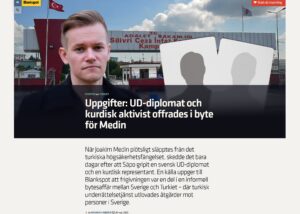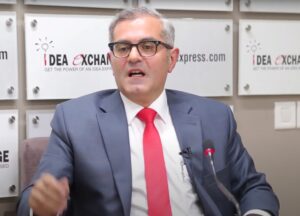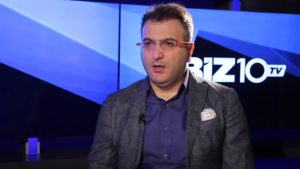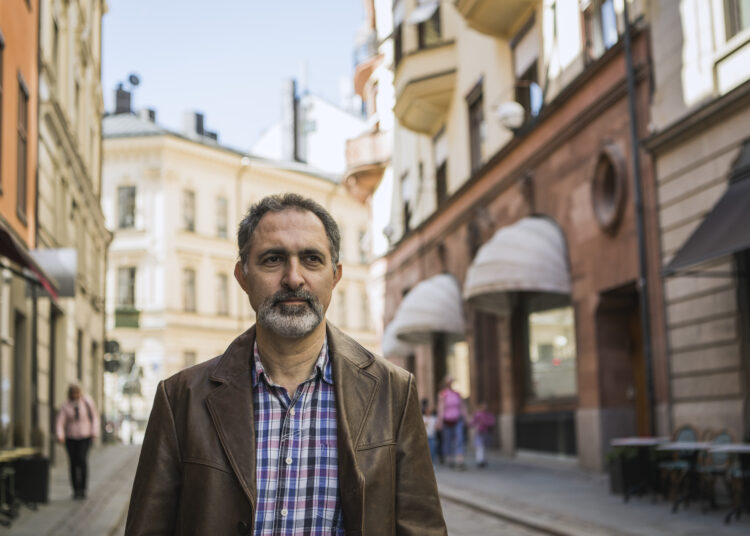Nordic Monitor/Stockholm
In a startling investigation published by the independent Swedish media outlet Blankspot.se on May 20, the Nordic Monitoring and Research Network — the publisher of the investigative platform Nordic Monitor — and its editor, Abdullah Bozkurt, were reportedly singled out by Turkish intelligence as targets for disruption.
This revelation emerged as part of Swedish journalist Rasmus Canbäck’s investigation into diplomatic and intelligence exchanges between Sweden and Turkey ahead of the recent release of jailed Swedish journalist Joakim Medin from a high-security prison in Istanbul. The article suggested that Medin’s release may have resulted from a covert diplomatic and intelligence arrangement between the two nations.
According to a confidential source with long-standing ties to intelligence operations in the Middle East who spoke to Blankspot anonymously, Turkey’s National Intelligence Organization (Milli İstihbarat Teşkilatı, MIT) demanded that specific individuals in Sweden be “disturbed” or hindered as a condition for Medin’s release.
Among those reportedly named were Shiyar Ali, a representative of the Kurdish Democratic Union Party (PYD) in Syria — an entity designated as a terrorist organization by Turkey — and an individual who runs Nordic Monitor.
While the article did not explicitly name Bozkurt, it was clear that MIT had been targeting him, given his role as the platform’s editor-in-chief.
Founded in 2019 by Bozkurt and his associate Levent Kenez — both Turkish journalists living in exile in Stockholm for nearly a decade — Nordic Monitor publishes investigative reports that often expose abuses by Turkey’s authoritarian regime under President Recep Tayyip Erdogan. The platform focuses in particular on the activities of Turkey’s intelligence agency, which has served as a key instrument of state repression, extending its reach well beyond the country’s borders.

Blankspot’s source, who reportedly worked in Middle East intelligence for decades, claimed that Medin’s release was part of a quid pro quo between MIT and Sweden’s intelligence agency, Säpo (Säkerhetspolisen).
“’A person from the Turkish intelligence service told me that the matter [Medin’s release] was resolved. As he said, it was directly with Säpo,’ the source stated. The person he met with [in Turkey] works close to the highest leadership of Turkish intelligence agency MIT,” the article stated.
The source noted that this exchange took place in early May during a visit to Turkey on unrelated business. According to Blankspot, intelligence sharing between Sweden and Turkey is routine, especially in light of the protracted negotiations surrounding Sweden’s NATO accession.

At a press conference on May 17, Swedish Foreign Minister Maria Malmer Stenergard denied any explicit quid pro quo for Medin’s release but confirmed the existence of intelligence cooperation between the countries. “There is an intelligence cooperation in general between Turkey and Sweden. But I have no knowledge of what is exchanged in those contacts,” she said.
Other Swedish officials echoed this sentiment following Blankspot’s article, dismissing any connection between Medin’s release and the temporary detention of a PYD representative and a Swedish Foreign Ministry diplomat in Sweden.
While no concrete evidence has been presented by Blankspot or other Swedish media to substantiate claims of a quid pro quo in Medin’s release, Turkish authorities’ targeting of Nordic Monitor is well documented.
The platform’s editors have published numerous articles with documentary evidence showing that Nordic Monitor has been in the crosshairs of the Turkish government for nearly a decade.

During prolonged NATO membership negotiations between Turkey and Sweden, Turkish officials controversially demanded the closure of Nordic Monitor. This explosive request, raised during confidential discussions, was inadvertently revealed by then–deputy foreign minister Burak Akçapar during a session of Turkey’s parliamentary Foreign Affairs Committee, which was reviewing Sweden’s NATO accession.
“The Nordic Monitor issue is a serious matter. … Naturally, the closure of this is part of, and will continue to be part of, the negotiations we conduct with Sweden,” Akçapar told lawmakers on November 16, 2023, while providing background information on the ongoing talks with the Swedish delegation to meet Ankara’s demands.
Justifying Turkey’s demand, Akçapar claimed that he and his colleagues had been targeted by the platform, citing investigative articles exposing surveillance conducted by Turkish diplomats abroad. Published documents have revealed that numerous Turkish embassies have conducted intelligence operations on dissidents, with this information subsequently relayed to Ankara, leading to reprisals against exiled critics and their families in Turkey. Akçapar himself was named in reports of spying activity during his tenure as ambassador in New Delhi.
The Turkish deputy minister also indicated that Turkey planned to exploit the joint security mechanism established between the countries at the NATO summit in Vilnius in July 2023 to extract further concessions from Sweden — even after it approved Sweden’s full NATO membership. He said a roadmap would be provided by Swedish authorities to address Turkey’s outstanding demands.

These revelations prompted a strong response from the Swedish Union of Journalists (Journalistförbundet), of which Bozkurt and Kenez are members. The union said it had previously warned about the risk of the Turkish government using NATO membership as leverage to target Turkish journalists living in exile in Sweden.
“It is completely unacceptable to demand that media outlets in Sweden cease their operations. The Turkish government’s attacks on journalists and media are a threat to our freedom of expression,” said Ulrika Hyllert, chair of the Swedish Union of Journalists, in a statement posted on the organization’s website on November 23, 2023.
The European Federation of Journalists (EFJ) also condemned Turkey’s efforts to shut down Nordic Monitor. EFJ President Maja Sever denounced the campaign as “filthy political blackmail” aimed at silencing journalists who are simply doing their jobs. “The EFJ strongly condemns these mafia-like practices,” she said.
The matter was reported to the Council of Europe’s Platform for the Safety of Journalists — a joint initiative between the CoE and leading press freedom organizations that monitors threats against media professionals.
Both Bozkurt and Kenez have been targeted by MIT, which has intensified its surveillance and intelligence operations across Europe, particularly targeting Turkish journalists in exile who strive to continue their profession under difficult circumstances.

In December 2016 Cem Küçük, a government propagandist with close ties to Turkish intelligence, called on MIT to assassinate Bozkurt. Speaking on TGRT TV, a loyalist government media outlet, Küçük said Bozkurt’s home address in Stockholm was known by Turkish authorities and demanded the “extermination” of the journalist.
“No need to beat around the bush anymore. Where they live is known, including their addresses abroad. Let’s see what happens if several of them get exterminated. How terrified they would be if you put bullets into the heads of some [critical] journalists,” he said.
Küçük was investigated in the past over Iranian Islamic Revolutionary Guard Corps (IRGC) Quds Force activities in Turkey, and Bozkurt’s writing on the Quds Force’s clandestine operations apparently bothered him.
Mesut Hakkı Caşın, the Turkish president’s advisor for security and foreign policy, openly threatened Bozkurt with murder on live TV, broadcast by a national television network, saying Turkish intelligence would find him and feed him to the sharks.
Speaking during a debate program on the pro-government CNN Türk on January 15, 2021, Caşın targeted Bozkurt and said: “Turkish national intelligence will find him, I’ll tell you that. I don’t know whether MIT will feed him to the fish or the sharks, but traitors always ultimately get their punishment.”
Caşın, a 65-year-old professor and former military officer, is a member of Turkey’s Presidential Security and Foreign Policy Board advising Erdogan on strategic matters.
Bozkurt was attacked by three unidentified men in September 2020 in front of his home in a Stockholm suburb and had move to a safe location. His address and private information were kept secret under Sweden’s laws protecting vulnerable persons. During the attack, he suffered scrapes and bruises to his face, arms and legs and was treated at a local hospital and then released.
On October 10, 2022 MIT leaked secretly taken photos of him to the Sabah daily, a regime mouthpiece that is owned by Erdogan’s family. His until-then-secret home address was revealed as a continuation of an ongoing Turkish government strategy aimed at harassing and intimidating the journalist. A few weeks later, MIT leaked surveillance photos of Kenez to Sabah as well.












